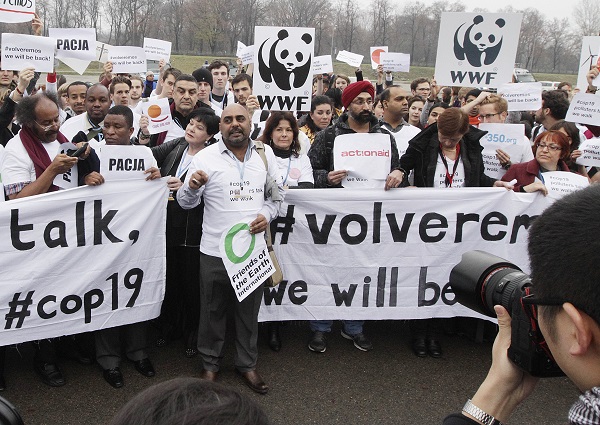‘Yolanda’ fails to move the rich

Members of non-governmental organizations walking out of the UN talks on global warming held at the National Stadium in Warsaw, Poland on Thursday, Nov. 21, 2013 to show their impatience with the government negotiators, who, the movements say, are making no progress in their task of laying foundations for a new climate deal. The talks are scheduled to close on Friday (Saturday in the Philippines). AP PHOTO/CZAREK SOKOLOWSKI
MANILA, Philippines—It seems the devastation wrought by Supertyphoon “Yolanda” in Eastern Visayas is not enough to convince developed countries to accept responsibility for climate change—and pay for it.
With two days left, there was commotion in climate change talks in Warsaw on Wednesday after the conference president, Poland’s environment minister, was fired in a government reshuffle and developing country negotiators, including those from the Philippines and China, walked out of a late-night meeting on compensation for climate impacts.
“We had shown much flexibility in the negotiations, but it is clear that developed countries are not really prepared to help developing countries [deal with] loss and damage due to climate change,” said Naderev Saño, the Philippines’ lead climate change negotiator.
After days of marathon negotiations, “with meetings lasting deep into the night and early mornings,” Saño said, the coalition of developing countries known as the Group of 77 and China (G77+China) walked out of the negotiations on loss and damage.
The Philippine delegation joined the walkout by the 133 nations in the G77+China bloc.
Article continues after this advertisement“The walkout came at a time when the world is seeing the devastating impacts of extreme weather events on peoples and communities, especially in developing countries,” the Climate Change Commission said in a statement on Wednesday.
Article continues after this advertisementYolanda (international name: “Haiyan”) struck central Philippines on Nov. 8, just days before the start of the United Nations-sponsored climate negotiations in Poland.
The supertyphoon, the strongest on record, flattened entire towns, killed more than 4,000 people, injured thousands and left hundreds of thousands homeless.
UN Secretary General Ban Ki-moon, speaking at the conference on Tuesday, called attention to the devastation caused by Yolanda, saying it should spur environment ministers to put new energy into efforts to curb global warming.
The 19th Conference of Parties of the UN Framework Convention on Climate Change (COP19) ends Saturday (Friday in Warsaw), but delegates have been complaining about scant progress, particularly on the vexed question of money, after more than a week of haggling.
Who is to blame?
The annual talks seek a way toward sealing a global accord at the end of 2015 for curbing greenhouse-gas emissions and channeling aid to poor, climate-vulnerable countries like the Philippines.
The question of who is to blame for global warming is central to developing countries who say they should receive financial support from rich nations to green their economies, adapt to shifts in the climate and cover costs of unavoidable damage caused by warming temperatures.
Also, they say the fact that rich nations, historically speaking, have released the biggest amounts of carbon dioxide and other heat-trapping gases, means they need to take the lead in reducing current emissions.
In Warsaw, Brazil even proposed developing a formula to calculate historical blame, to guide talks on a new global climate deal in 2015.
“They must know how much they are actually responsible … for the essential problem of climate change,” Brazilian negotiator Raphael Azeredo said.
Dividing responsibility
Developed nations blocked that proposal, saying you must also look at current and future emissions when dividing the responsibility.
China, though still a developing economy, overtook the United States to become the world’s biggest carbon polluter last decade, and developing countries as a whole now have higher emissions than the developed world.
To focus only on past emissions “seems to us as very partial and not very accurate,” US climate envoy Todd Stern said earlier this week.
The 2015 deal is supposed to establish what climate actions countries will take after 2020. The Warsaw conference is supposed to lay the foundation for that agreement but it was unclear on Wednesday whether countries would be able to agree on basic stepping stones including a timeline for when commitments should be presented.
The government of Poland, which has been criticized at the talks for hosting a coal summit at the same time, stirred things up further on Wednesday by replacing Environment Minister Marcin Korolec, who is presiding over the climate conference.
Korolec told reporters the move would not affect his duties as conference president.
Loss and damage
At a related meeting on Wednesday, the Climate Change Commission’s vice chair, Lucille Sering, pushed for the establishment of a loss and damage mechanism for countries hardest hit by extreme weather events arising from climate change.
Sering thanked the countries at the climate talks for their support for the victims of Yolanda.
But “relief is only temporary,” she said.
Sering told environment ministers at the meeting that loss and damage mechanisms would help countries deal with the immense impacts of extreme weather events.
“Loss and damage is not compensation but prevention,” she said.
Sering said this would help countries prepare for the effects of climate change, prevent the migration of victims, and help them rebuild their communities.
“We want to be where we are hence our desire to strengthen our resiliency against climate change. We have seen an exodus of people moving out of affected areas, but most of them are still hoping to be able to return as soon as the situation permits. We intend to translate the hope to reality,” she said.—With reports from AP and AFP